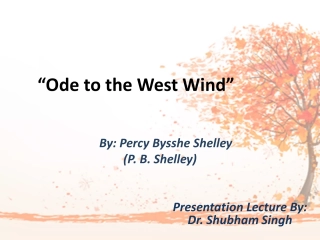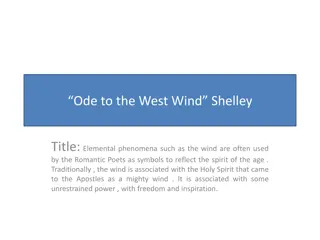Analysis of "The Flower That Smiles Today" by Percy Bysshe Shelley
This analysis delves into Percy Bysshe Shelley's poem "The Flower That Smiles Today," exploring themes of transience and impermanence in life. The author's purpose is to depict the fleeting nature of joy and beauty, urging readers to appreciate the present moment. Through poignant verses, Shelley captures the essence of ephemeral pleasures and the underlying melancholy of human existence.
Download Presentation

Please find below an Image/Link to download the presentation.
The content on the website is provided AS IS for your information and personal use only. It may not be sold, licensed, or shared on other websites without obtaining consent from the author. Download presentation by click this link. If you encounter any issues during the download, it is possible that the publisher has removed the file from their server.
E N D
Presentation Transcript
s.roshni ASSISTANT PROFESSOR jamal mohammed college trichy -20
THE FLOWER THAT SMILES TODAY P.B.SHELLEY
AGENDA i) About the Author ii)About the poem iii)Author s Purpose iv)Poem lines v)Line by line explanation
About the Author Percy Bysshe Shelley 4 August 1792 8 July 1822) was one of the major English Romantic poets. Shelley did not achieve fame during his lifetime, but recognition of his achievements in poetry grew steadily following his death. his best-known works are "Ozymandias" (1818), "Ode to the West Wind" (1819), "To a Skylark" (1820), and the political ballad The Mask of Anarchy (1819). His other major works include the verse drama The Cenci (1819) and his final, unfinished work, The Triumph of Life (1822). He died in a boating accident in 1822 at the age of twenty- nine.
ABOUT THE POEM The Flower That Smiles Today', is a poem about the brevity of all things all hopes, desires, and delights the world has to offer are short-lived and doomed to die.
AUTHORS PURPOSE The authors purpose is to show his readers how things in life are temporary and that they should cherish them before those things eventually go.
The flower that smiles to-day To-morrow dies; All that we wish to stay Tempts and then flies. What is this world s delight? Lightning that mocks the night, Brief even as bright.
Virtue, how frail it is! Friendship how rare! Love, how it sells poor bliss For proud despair! But we, though soon they fall, Survive their joy, and all Which ours we call.
Whilst skies are blue and bright, Whilst flowers are gay, Whilst eyes that change ere night Make glad the day; Whilst yet the calm hours creep, Dream thou and from thy sleep Then wake to weep.
LINE BY LINE EXPLANATION The flower that smiles to-day To-morrow dies;
All that we wish to stay Tempts and then flies. People wish for certain Things in life to stay Forever but they re only Temporary.
What is this worlds delight? Lightning that mocks the night, Brief even as bright. Shelley uses lightening as an example To demonstrate how Quickly things come and go
Virtue, how frail it is! Friendship how rare! Love, how it sells poor bliss For proud despair!
But we, though soon they fall, Survive their joy, and all Which ours we call. But we the people immediately fall these temporary happiness and lead a remaining life with these memories.
Whilst skies are blue and bright, Whilst flowers are gay,
Whilst eyes that change ere night Make glad the day; Night is usually thought of as passing by quickly since we all sleep during that time while the day passes more slowly and we can enjoy the brief moments in life if we choose to.
Whilst yet the calm hours creep, Dream thou and from thy sleep Then wake to weep. People don t realize what they have until they lose it. Once they realize what they ve lost. There s normally a fear of loss so there s a greater chance that they will learn to appreciate things more in the future.























